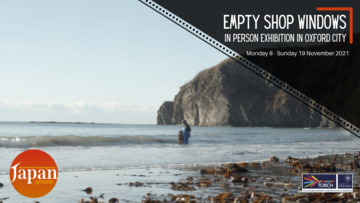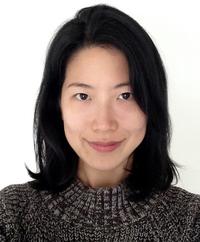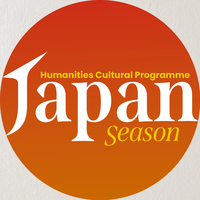Oxford Window Installations by Eiko Soga
Exhibition around Oxford City Centre

Image credit: ’Ainu Shuji Kikuchi, Kelp Foraging in Samani’ (2021).
JAPAN SEASON 2021
Part of the Humanities Cultural Programme, one of the founding stones for the
future Stephen A. Schwarzman Centre for the Humanities.
This exhibition is free to attend and takes place across three locations in Oxford.
'My Neighbour's Meal’ 95 Gloucester Green, Oxford 8th -19th November, Open Daily 12pm-4pm for the duration of the residency - Tickets not required
‘More-Than-Human World’ Window Galleries, Friars Entry Oxford 8th - 30th November - Tickets not required
'Autumn Salmon' - Pitt Rivers Museum, Oxford 8th - 30th November - please visit Pitt Rivers Museum website in case booking is required
The Window Galleries includes video projections in the shop windows of empty shops in Oxford city centre. Artist, Eiko Soga, will share her work which combines video, poetry and ethnography, based on an engagement with the value system of the Ainu. It focuses on women’s affective gestures and question how artworks might engage with a sense of value that generates ecological and empathetic knowledge. Eiko has spent time in Samani, Hokkaido to connect and develop this work.
'My Neighbour's Meal’
95 Gloucester Green, Oxford Open Daily - Tickets not required
In this exhibition, Eiko Soga raises a question: Do you ever envision the kind of culture your neighbours grew up with and lived in? She starts a conversation about this by focusing on food and cooking.
Between 2020–21, Eiko learnt Ainu traditional cooking from an Ainu elder, Ms Kane Kumagai in Samani in Hokkaido, Japan. Traditional Ainu cooking is considered to be ecological and community oriented. Eiko looks at cooking as a space to exchange empathy, mutual effort and lived knowledges, in order to unpack the interrelationships among historical, cultural and natural landscapes. Attempting to unfold this complex social landscape has allowed her to learn stories of disvalued knowledge through a compassionate approach. As a result, she has gained a better sense of how our sensory knowledge-based engagement with both people and nature contributes to a diverse eco-system.
In 2016, Eiko also worked with an Ainu hunter called Mon-chan in Nibutani in Hokkaido. He took her to the mountain where he hunts and she tried to understand what hunting means to Mon-chan experientially. The result is a video work showing the process through which she unlearnt her social norms and tried to embody Mon-chan's values.
Through this installation, Eiko hopes to encourage audiences to be interested in the culture of people who are close to us physically but who might be far away emotionally and culturally.
‘More-Than-Human World’
Window Galleries, Friars Entry, Oxford Open Daily - Tickets not required
Eiko Soga has been working with the indigenous communities called Ainu in Hokkaido, Japan. Through her research-led art projects, she has been questioning how the practice of art can embody and share ‘felt knowledge’ of the more-than-human world. These images are taken while Eiko was learning contemporary Ainu elders’ world views and wisdom.
'Autumn Salmon'
Pitt Rivers Museum, Oxford Please note this installation is managed by Pitt Rivers Museum - please visit their website as booking may be required.
In 2016, Eiko Soga lived with an Ainu woman called Ms.Katsue Kaizawa and studied the making of Ainu kimono, embroidery, and salmon-skin shoes. In this video, she focused on the idea of process and making-as-sensory-study. In Ainu culture, salmon traditionally served key economic, religious, and spiritual roles. Today, it still plays an important role within Ainu communities but primarily to sustain their traditional values. In this video, we see a text that Eiko wrote about Ainu social phenomena centered on salmon. This process allowed her to explore a wider understanding of Ainu culture– fishing, cooking, politics, economics, ecology, craft, gossip, folklore, and differences between the current Ainu communities in other regions. It was a process, in part, of finding clues from the past that shed light on present issues.
Artist Biography:

Eiko Soga (Ruskin) lives and works in England is currently reading for her DPhil at The Ruskin School of Art, University of Oxford. Through ethnography-led art practices, Eiko explores the interrelationships within historical, cultural, emotional, and natural landscapes and how an art can embody felt knowledge of more than the human world. Her research uses storytelling as a way to observe and document how minor, ephemeral, and sensory aspects of everyday processes can lead to bigger phenomena such as collectiveness and the development of culture. In doing so, she moves away from the social and educational forms imposed by colonial and imperialistic norms. The heart of Eiko’s work is cultivating a conversation about rewilding and decolonisation in response to societies that have been shaped by urban-capitalism-centric developments. Her work often takes the form of videos, photography, and poetry.
Selected exhibitions include: Video Forms Digital Arts (France), Learning from the Folklorist Tsuneichi Miyamoto, Ichihara Lake Side Museum (Japan), Kuroko, Index Festival Hub, Yorkshire House (UK), Bamboo Tori, Sapporo CAI (Japan), Nemagaridake, Uymam Art Project (Japan). Conferences and artist talks include: Relabelling Project, the Pitt Rivers Museum (UK), Imagining Our Digital Futures: The View From Japan, The University of Sheffield, School of East Asian Studies (UK), Blue Seas Thinking: A Workshop on Interdisciplinary Marine Social Science (UK), 3rd Tanaka Symposium in Japanese Studies, Pembroke College, University of Oxford (UK), Ecologies of Knowledge and Practice: Japanese Studies and the Environmental Humanities, University of Oxford (UK). Workshops include: Artistic Practice - Working With Displaced. Arts Catalyst (UK), THE ANIMUNCULUS, Oxford-UdK Berlin Partnership in Arts and Humanities (Germany and UK).
Eiko is a graduate of MFA Sculpture at the Slade School of Fine Art and MSc Japanese Studies at University of Oxford. She is an associate lecturer at Chelsea College of Arts in London.
This exhibition is supported by TORCH as part of the Humanities Cultural Programme: Japan Season and by Fusion Arts.
Fusion Arts is supported by Oxford City Council and through the Culture Recovery Fund grants awarded to Fusion Arts from Arts Council England on behalf of the Department for Culture, Media and Sport.




